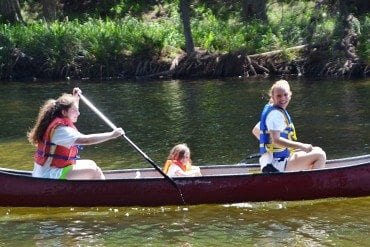When most people think about the benefits of sleep-away camp, they think of fun and friends—and with good reason. Where else can a child ride a horse, create a ceramics masterpiece and water ski, all in the same day? Camp is also a friend-making machine. My mother once observed that all children arrive at camp with one thing in mind—they want to make a new friend. Many adults count camp as the happiest days of their childhood.
But the right summer camp experience is about so much more than fun. Quality camps provide lasting benefits that create a long-term advantage for the children that attend them.
The best summer camps are partners in your parenting process. Raising a child is way too important to do alone. My wife and I have four children, and we deeply value the teachers, coaches, mentors and other adults that help our children grow into (we hope) exceptional adults. Our children certainly love us, but they get tired of hearing advice from us. When another adult—particularly a cool and engaged one—reinforces our values, they hear the message with new ears.
The right sleep-away camp makes an excellent partner and is effective in addressing the challenges faced by today’s children. Here are some reasons why.
1. Camp Is Tech-free
The average American teen spends over 52 hours each week looking at electronic screens. While much of this time can be productive, it has reduced the amount of time that children interact face-to-face. When face-to-face time becomes screen-to-screen time, our children lose the ability to practice critical interpersonal and character skills. All of us—parents and children alike—are a little too connected to our electronic devices.
At camp, children put down the devices and hone their interpersonal skills. Screen-to-screen texting becomes face-to-face chatting and arm-in-arm strolling. Camp may be the only place a child is tech-free for multiple weeks and is thankful for it. The campers’ experience is immersive, and they can’t pick up technology when they return home at the end of the day.
2. Camp Provides Cool Role Models

I hate to break this to my fellow parents, but we are not that cool in the eyes of our children. It is natural for children to seek out role models beyond their own parents. The question is not whether they will seek out different role models, but who those role models will be. In a vacuum, pop stars and athletes become the role models. At camp, the heroes are upbeat, fun and talented college students committed to impacting their campers.
I know that “hero” is a strong word, but we are amazed at the counselors we see every summer. Many were once campers themselves, but others come from around the world. What they share is a deep desire to help children grow.
3. Camp Builds Confidence
One of the best ways to grow is to take “reasonable risks” and learn new skills. If you think about it, virtually every meaningful growth experience of your life involved trying something new and unfamiliar. Learning new skills helps expand our belief in ourselves and makes us feel more capable.
At camp, every camper encounters new activities that foster growth. Children who are comfortable with athletics get some exposure to creative activities, while artistic children can find a physical activity that they enjoy.
4. Camp Teaches That Growth Follows Failure
In school, failure is dreaded. We do not want our children to fail tests or projects; we want them to soar and succeed. But innovation and creativity require a willingness to try new things and, yes, occasionally fail. We want our children to know that they can fail, bounce back, try again and ultimately triumph. At camp, no one really cares if you reach the top of the climbing wall or get up on a wakeboard. These shortcomings do not show up on a child’s permanent record. Campers learn perseverance and resilience while having fun.
5. Camp Builds the Skills That Predict for Success
A huge body of research has defined a set of skills that are more important than IQ or test scores in predicting for future success. These include communication, teamwork, leadership, creativity and “grit.” These skills have always been important, but the modern world has made them even more so. Specific knowledge is less important because we have portable computers in our pockets. Teamwork and communication are critical to success. Creative thinking is rare and valuable.
The wonderful news is that research also reveals that these skills can be taught. The best and most forward thinking camps put a heavy emphasis on these skills and train their counselors to foster these skills in their campers. Since camp counselors do not have to work on specific curriculum (such as algebra or grammar), they can focus on group dynamics, conflict resolution, leadership skills, resilience and collaboration.
Few experiences provide such a rich combination of growth and fun as a sleep-away camp. Parents who take the time to find the right camp-partner will see the benefits for years to come.
Check out our Summer Camp Guide!
_______________
Steve Baskin and his wife operate a summer camp for boys and girls in the hill country of Central Texas.




















